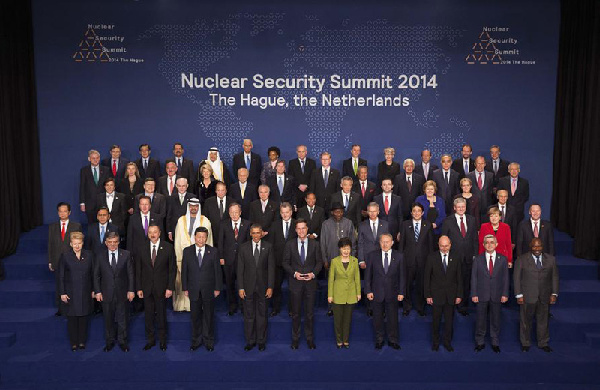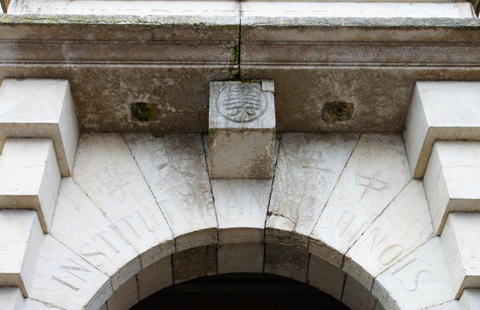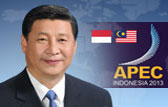Xi pledges to bolster nuclear security
Updated: 2014-03-26 01:52
By WU JIAO in The Hague and ZHAO YANRONG in Beijing (China Daily)
Comments Print Mail Large Medium SmallWorld leaders urge countries at summit to minimize their stocks of highly enriched fuel
President Xi Jinping says China will continue to strengthen its nuclear security capability, and remains firmly committed to building an international nuclear security system and supporting global cooperation.
He made the remarks at the third Nuclear Security Summit in The Hague on Monday.
 |
|
World leaders and attendees pose for a family photo during the Nuclear Security Summit in The Hague March 25, 2014. [Photo/Agencies] |
Elaborating on his country's approach, Xi called for global cooperation to ensure nuclear energy's lasting security and development.
After the two-day summit, the president left for France on Tuesday afternoon to continue his four-country European tour, which will also take him to Germany and Belgium.
Aimed at preventing nuclear terrorism, the summit seeks to reduce the amount of dangerous nuclear material in the world, improve security of all nuclear material and radioactive sources, and strengthen international cooperation.
On Tuesday, Xi called on nations to work together to prevent and crack down on nuclear terrorism in all forms.
Together with Xi, leaders from more than 50 countries and international organizations gathered in The Hague to assess past achievements in safeguarding global nuclear security and to seek more action in preventing nuclear material from falling into the wrong hands.
At the end of the summit, world leaders called for countries to minimize their stocks of highly enriched nuclear fuel to help prevent al-Qaida-style militants from obtaining atomic bombs.
In a joint statement, leaders from 53 countries said much headway has been made in the past four years.
But they also made clear that many challenges remain and stressed the need for increased international cooperation to ensure highly enriched uranium, plutonium and other radioactive substances do not go astray.
In a speech at the summit, Xi said the use of nuclear energy has given new impetus to the progress of humanity, but mankind must be able to respond to various nuclear security challenges and ensure the safety of nuclear materials and facilities.
While giving details of China's approach to promoting nuclear security, he said the world should place equal emphasis on development and security, and develop nuclear energy on the premise of security.
Xi urged all nations to fulfill their duties regarding nuclear security and to implement the related United Nations Security Council resolutions.
"While addressing the importance of countries honoring their international obligations, we should respect their right to adopt nuclear security policies and measures best suited to their specific conditions," he said.
Xi also said that nuclear security remains a global endeavor, and he urged that more countries be included in the international nuclear security process.
He said that to effectively eliminate risks of nuclear security and nuclear proliferation the international community should develop modern, low-risk nuclear energy technologies, maintain balanced supply and demand for nuclear materials, strengthen non-proliferation efforts and promote international cooperation against nuclear terrorism.
China has tightened nuclear security measures, improved technology and emergency response, and conducted comprehensive security checks on nuclear facilities across the country, the president added.
"China gives top priority to nuclear security in the peaceful use of nuclear energy," he said.
Zhu Xuhui, a researcher at the China National Nuclear Corporation and an expert in uranium enrichment and nuclear fuel, said China has been a very active player in international cooperation.
For instance, the largest nuclear security center in the Asian-Pacific region, financed by China and the United States, is being built in Beijing, and is expected to be operational next year.
"China also works very closely with the International Atomic Energy Agency. We provide five to six training programs with the agency on nuclear security every year," Zhu said.
Huang Xiaoyong, director of the Center for International Energy Security Studies at the Chinese Academy of Social Sciences, said the nuclear security issue is a top concern for every country that relies on the energy source.
Huang added that China has been developing and using nuclear energy for five decades.
The Nuclear Security Summit, initiated by US President Barack Obama, has become an important platform for addressing nuclear security issues. Its first meeting was held in Washington in 2010 and the second in Seoul in 2012.
Reuters contributed to this story.
Contact the writers at wujiao@chinadaily.com.cn and zhaoyanrong@chinadaily.com.cn







